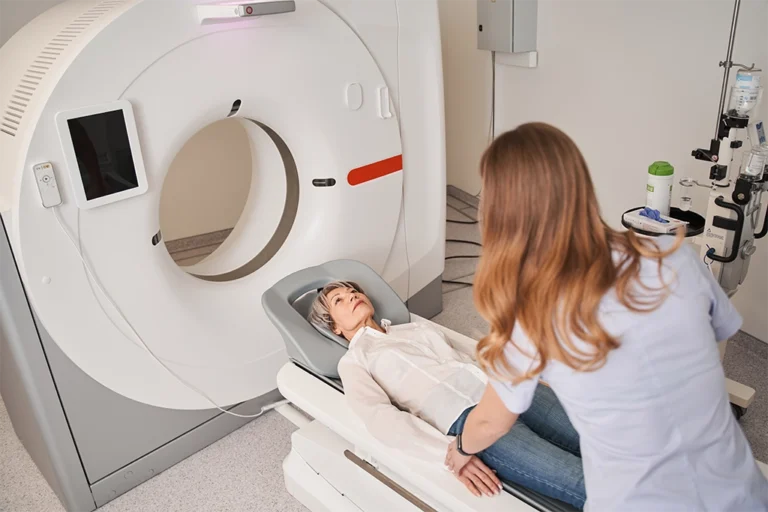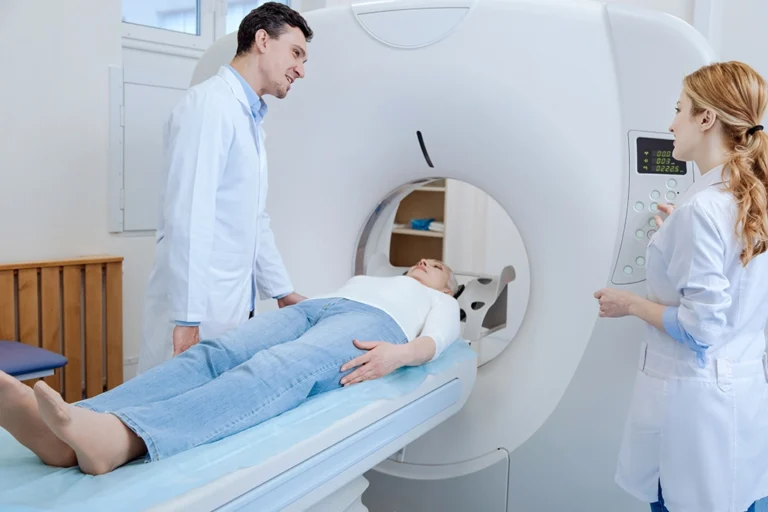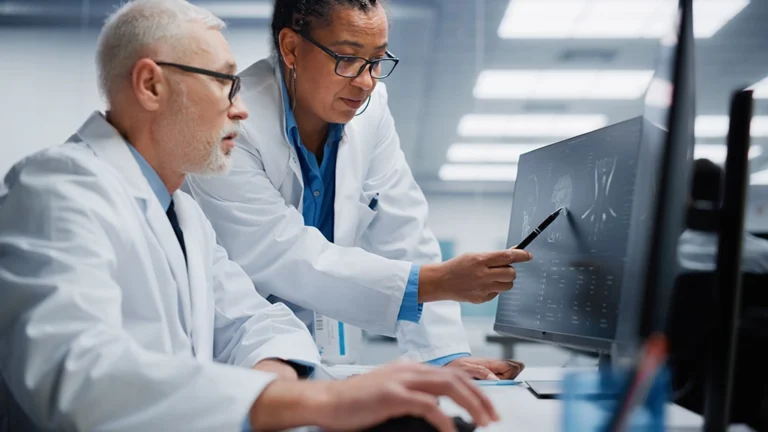Detecting cancer early is important for effective treatment and improved outcomes. While some cancers have specific screening methods like mammograms for breast cancer or MRIs for prostate cancer, others are harder to detect. Computed tomography (CT) scans provide a comprehensive view of the body to identify various types of cancers outside of the ones mentioned above. At South Jersey Radiology, we prioritize early detection through our advanced CT imaging services.
The Role of CT Scans in Cancer Detection
Diagnostic imaging, including CT scans and MRIs, play a crucial role in cancer diagnosis, especially for cancers that may not exhibit symptoms until later stages. Unlike X-rays or blood tests, CT scans offer detailed insights into the body, making them instrumental in identifying abnormalities affecting the liver, kidneys, pancreas, spleen, gastrointestinal tract, and other areas.
What Cancers Are Detectable By CT Scans?
The following cancer types can be detected and monitored by a CT scan:
- Bladder Cancer – Bladder cancer often presents with symptoms like blood in the urine or changes in urination patterns. In some cases, symptoms may not appear until the cancer is in more advanced stages. CT scans can detect bladder cancer by revealing conditions affecting the bladder wall or nearby tissues.
- Kidney Cancer – Renal cell carcinoma, the most common type of kidney cancer, may not cause symptoms in its early stages. CT scans can detect kidney tumors, allowing for early intervention before the cancer spreads to surrounding tissues or organs. Additionally, CT imaging can help determine the size and location of the tumor, guiding surgical approaches for improved success rates.
- Lung Cancer – Lung cancer is often asymptomatic in its early stages, making it challenging to detect until it has progressed. Oftentimes, CT scans function as a routine lung cancer screening, particularly for individuals with high risk factors, such as smokers or those with a family history.
- Ovarian Cancer – Ovarian cancer is very difficult to detect early due to vague symptoms or the absence of tailored, routine screening options. CT scans can detect ovarian tumors and assess their size, location, and potential spread to adjacent areas.
- Stomach Cancer – Stomach cancer often presents with non-specific symptoms like abdominal pain, indigestion, or unexplainable weight loss, which may be attributed to other gastrointestinal conditions. CT scans can visualize the stomach and surrounding tissues, identifying abnormalities such as tumors or thickening of the stomach wall, a sign of cancer.
- Colon Cancer – Colon cancer screening is important for early detection and prevention. While traditional colonoscopies remain the gold standard for detecting pre-cancerous polyps or early-stage tumor, CT colonography (virtual colonoscopy) offers a non-invasive alternative for some patients. CT scans can visualize the colon and identify suspicious lesions, signaling the need for additional procedures or imaging.
Monitoring Cancer Treatment Progress With CT Scans
Not only do they serve a valuable role in detecting cancer, but CT scans may be used to monitor treatment progress and assess response to therapies as well. Following a confirmed diagnosis, patients undergoing cancer treatment often undergo timely CT scans to evaluate the effectiveness of chemotherapy, radiation therapy, or surgical interventions. CT Imaging can track changes in tumor size, identify new lesions, or detect signs of disease recurrence, guiding adjustments to the treatment plans for better outcomes.
Why Choose A CT Scan for Cancer Detection?
Despite advancements in cancer research, certain types of cancers remain difficult to pinpoint, often developing and spreading without noticeable symptoms for years. In fact, some cancers can progress asymptomatically for over a decade. CT scans provide a deeper, comprehensive view, helping prevent cancer from advancing into later stages and guiding treatment.
Is A CT Scan Right For You?
Consulting with your referring physician and reviewing your medical history will determine whether a CT scan is appropriate for you. If you have a family history of specific cancers or participate in high-risk behaviors such as smoking or consuming alcohol, a CT scan may offer valuable insights into your health.
Schedule Your Appointment Today
At South Jersey Radiology, we are committed to providing advanced diagnostic imaging services, including CT scans, at costs up to 60% less than hospital based centers. Take a proactive step toward monitoring your health by scheduling a CT scan appointment at any of the following locations:
- Haddonfield Office – Haddonfield, NJ
- Marlton (Greentree) Office – Marlton, NJ
- Medford Office – Medford, NJ
- Moorestown Office – Moorestown, NJ
- Mount Laurel Office – Mount Laurel, NJ
- Route 73 (Voorhees) Office – Voorhees Township, NJ
- Turnersville Office – Turnersville, NJ
- Voorhees (Carnie Blvd) Office – Voorhees Township, NJ
- Sewell (Washington Twp) Office – Sewell, NJ
- West Deptford Office – West Deptford, NJ
- Willingboro Office – Willingboro, NJ
Learn more about the board-certified, subspecialized radiologists who read and interpret our studies at SJRA today.
Frequently Asked Questions
A CT (computed tomography) scan is a non-invasive imaging technique that uses X-rays and computer technology to create detailed cross-sectional images of the body. CT scans play an important role in cancer detection by providing comprehensive views of internal organs and tissues, allowing our radiologists to identify abnormalities indicative of cancer, such as tumors or lesions.
CT scans detect various types of cancer, including bladder cancer, kidney cancer, lung cancer, ovarian cancer, stomach cancer, and colon cancer. These imaging studies enable early detection by capturing detailed images of affected areas, even in the absence of symptoms.
After a cancer diagnosis, patients often undergo treatments such as chemotherapy, radiation therapy, or surgery. CT scans are utilized to monitor the response to these treatments and assess disease progression or regression. By tracking changes in tumor size, identifying new lesions, or detecting signs of recurrence, CT scans guide adjustments to the treatment plan for better outcomes.
CT scans are considered safe and effective when performed by trained professionals using appropriate protocols. While CT scans involve exposure to a small amount of radiation, the benefits of early cancer detection and treatment monitoring generally outweigh the risks. Referring physicians carefully consider factors such as the patient’s age, medical history, and potential risks associated with radiation exposure before recommending CT scans.
Individuals at increased risk of developing certain types of cancer, such as those with a family history of the disease or specific risk factors like smoking, may benefit from CT scans for early detection. Additionally, individuals experiencing symptoms suggestive of cancer or undergoing cancer treatment may require CT scans for diagnostic purposes or treatment monitoring.
The frequency of cancer screenings with CT scans depends on various factors, including the individual’s age, medical history, and risk factors for specific cancers. Healthcare providers typically recommend personalized screening schedules based on guidelines from organizations such as the American Cancer Society. Regular discussions with your physician can help determine the appropriate timing and frequency of CT scans for cancer screening and monitoring.
During a CT scan, you will lie on a movable table that slowly slides into the CT scanner, which resembles a large doughnut-shaped machine. The technologist operates the scanner from an adjacent room, while you may be asked to hold your breath briefly during image acquisition to minimize motion artifacts. The study is painless and usually takes only a few minutes to complete, though you may need to drink a contrast material or receive an intravenous injection for enhanced imaging in some cases.




